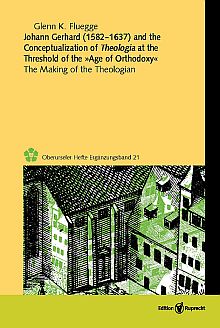Johann Gerhard (1582–1637) and the Conceptualization of Theologia at the Threshold of the »Age of Orthodoxy«
The Making of the Theologian
Autor/Hrsg.: Fluegge, Glenn K./Klän, Werner/Kolb, Robert A.
Erscheinungsjahr: 2018
ISBN: 978-3-8469-0300-1
Reihe: Oberurseler Hefte Ergänzungsbände, Band: 21
Seiten: 258 mit 3 Grafiken
Ausstattung: Hardcover
mit einer deutschsprachigen Zusammenfassung von Werner Klän und einem Geleitwort von Robert Kolb
What is theology? How is it related to personal faith and pastoral practice? How does one go about studying theology? This book explores how one prominent Lutheran theologian, Johann Gerhard (1582–1637), addressed these enduring questions at the beginning of the »Age of Orthodoxy« during a time of tension between those who viewed theology as personal piety and those who considered it an academic discipline. This makes his understanding of theology rather insightful and quite unique. Fluegge closely examines a wide variety of Gerhard’s writings and proposes a more nuanced understanding of this important theologian’s transitional concept of theology and its connection to other aspects of life. Throughout one gains a deeper appreciation for this often neglected period of Christianity.
Glenn Fluegge hat mit seiner gründlichen Untersuchung zu Johann Gerhards Verständnis von Theologie ein Gespräch eröffnet, das weit über den Bereich der lutherischen Kirche hinaus, also auch ökumenisch, Impulse geben kann für das notwendige Nachdenken über Ausbildung und Arbeit von Pastoren im 21. Jahrhundert. (Robert Kolb, übersetzt und zitiert von Werner Klän in der deutschsprachigen Zusammenfassung des Buchs)
Table of Contents
Preface
About this Book (Robert Kolb)
Introduction
1. Background
1.1 Age of Orthodoxy
1.2 Johann Gerhard
2. Statement of Problem
2.1 Need for Microhistories
2.2 Need for Correctives
3. Statement of Purpose & Research Questions
4. Methodology
4.1 Research Method & Validation
4.2 Research Steps
4.3 Source Selection
4.4 Terminology
5. Review of Relevant Secondary Literature
6. Structure
I Habitus in the Historical Context of the Reformation
1. Introduction
2. Habitus in its Melanchthonian Aristotelian Framework
2.1 Definition of Habitus
2.2 Kinds of Habitus
2.3 Interconnectedness of the Habitus
3. Reformation Concern over the Concept of Habitus
3.1 Pre-Reformation: Augustine and Aquinas
3.2 Reformation: Martin Luther
4. Conclusion
II Gerhard’s Use of Habitus
1. Introduction
2. Contemporary Context
2.1 Reintroduction of Habitus into Lutheran Theology
2.2 Inter-Lutheran Conflict over the Idea of Theologia as Habitus
3. Literary Context
3.1 Use of Habitus Outside of the Prooemium
3.2 Use of Habitus in the Prooemium
4. Conclusions and Implications
III Theologia as Habitus Theosdotos
1. Introduction
2. Gerhard’s Qualified Use of Habitus
2.1 Objections to Aristotle’s Habitus
2.2 Renovation of Habitus
3. Gerhard’s Theory of Cognition
3.1 Aristotelian Background
3.2 Interpretation of Scripture: Doctrine of Illumination
4. The Rahtmann Debate: Scripture as Means of Grace
5. Conclusion
IV Theologia as Practica
1. Introduction
2. Understanding ‘Theologia as Practica’ in Context
2.1 Seventeenth Century versus Contemporary Views of ‘Practical’
2.2 The Conundrum of Theologia as a Practical Discipline
3. Gerhard’s Concept of Practica
3.1 Gerhard’s Delimitations of Theologia as Practica
3.2 The Aim of Theologia that is mostly Practica: theosdotos (Pietas)
3.3 Understanding Gerhard’s Concept of Pietas
3.4 Gerhard’s Concept of Practica: Auto-praxis or Allo-praxis?
4. The Efficacy of the Word and Theologia as Practica
5. Conclusion
V Defining Theologia
1. Introduction
2. Situating Gerhard’s Definition
3. Analyzing Gerhard’s Definition
3.1 ‘Theologia ... est habitus theosdotos per verbum a Spiritu sanctu homini collatus’
3.2 ‘... quo non solum in divinorum mysteriorum cognitione per mentis illuminationem instruitur’
3.3 ‘... ut quae intelligit in affectum cordis et exsecutionem operis salutariter traducat’
3.4 ‘... sed etiam aptus et expeditus redditur ... informandi ... vindicandi’
3.5 ‘... ut homines fide vera et bonis operibus rutilantes ad regnum ... perducantur.’
4. Conclusion
VI Implementation of Theologia
1. Introduction
2. Overview of the Methodus
3. Preface
3.1 Definition of Theologia in the Methodus
3.2 Definition of Theologiae Studium
4. Requisites of Theological Study
4.1 Use of Luther’s Trias
4.2 Daily Duty of Devout Prayer
4.3 Obligation of Right Intention
4.4 Sincere Pursuit of Piety
5. Course of Theological Study
6. Coronis de Tentatione
6.1 Tentatio as the Necessary ‘Transfer’
6.2 Tentatio as ‘Self-Application’ of Theologia
7. Conclusion
V Conclusion
VI Zusammenfassung (Werner Klän)







